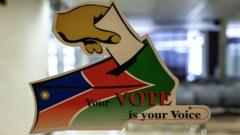This year has seen significant electoral shifts in sub-Saharan Africa, with incumbents losing ground amid widespread frustration over economic hardships and governance failures. Notably, Namibia's Swapo retained a weakened position, while parties like Botswana's BDP faced significant losses, highlighting a trend of increasing opposition strength and voter demand for change.
Voter Discontent Shakes Africa's Long-Dominant Parties

Voter Discontent Shakes Africa's Long-Dominant Parties
As elections unfold across sub-Saharan Africa, long-standing governing parties are facing unprecedented challenges, reflecting a wave of popular discontent driven by economic hardship and corruption perceptions.
As sub-Saharan Africa grapples with a wave of electoral changes, the trend of long-standing governing parties facing serious challenges continues to unfold. Namibia’s ruling party, Swapo, which has been in power since independence, has experienced a notable weakening of its grip after the recent election. Official results indicate that Swapo's candidate, Netumbo Nandi-Ndaitwah, secured only 57% of the presidential votes, marking her as the country’s first female leader. However, the election results have been disputed by opposition parties citing logistical issues and irregularities during the polls.
While Swapo remains in power, they have suffered significant losses in the parliamentary elections, dropping 12 seats and clinging to a tenuous majority. The situation encapsulates a broader trend observed in other sub-Saharan African nations this year, with many incumbents experiencing severe setbacks. Countries across the region that participated in elections under reasonably fair conditions have seen ruling parties either lose significant seats or entirely relinquish power.
Economic downturns, increased public frustration over corruption, and the emergence of well-coordinated opposition groups are largely blamed for this rise in electoral contestation. A striking example comes from Botswana, where the ruling Botswana Democratic Party (BDP) faced a dramatic defeat, decreasing its parliamentary representation from 38 seats to just four, casting doubt on its relevance moving forward. Similarly, Mauritius observed a political upheaval in November as the ruling Alliance Lepep coalition suffered a landslide defeat.
Opposition victories have also emerged in Senegal, where the release of key opposition figures from prison allowed them to galvanize support and win against the government candidate, who only garnered 36% of the vote. South Africa's African National Congress (ANC) managed to retain power for the first time since the end of apartheid, but not without severe reputational damage, capturing less than 50% of the vote and having to form a coalition government.
This year’s political climate reflects a significant shift in public sentiment across the region. Factors such as economic distress, rising living costs, and perceived government mismanagement have intensified citizen dissatisfaction, prompting protests like those seen in Kenya against higher taxes.
What is noteworthy in this trend is not simply a regional reaction but also a part of a global phenomenon where voter discontent is reshaping political landscapes, evident in countries like the UK and the US. Unique to Africa, however, is the resilience of its opposition, illustrated by strategic coalitions and vigilant electoral monitoring as opposition groups seek to secure their victories.
With upcoming elections in Ghana and Malawi, the potential for continued opposition gains appears likely. If Ghana sees a change in political power, 2024 might indeed be marked as a historic year for opposition wins in sub-Saharan Africa. Amid a global backdrop of rising authoritarianism and democratic decline, the events unfolding in Africa showcase a remarkable resilience and demand for accountability from the electorate. Civil society and ordinary citizens have mobilized to uphold democratic values, emphasizing the need for international observers to recognize and support this emerging political dynamism in a region long viewed as resistant to multiparty competition.



















